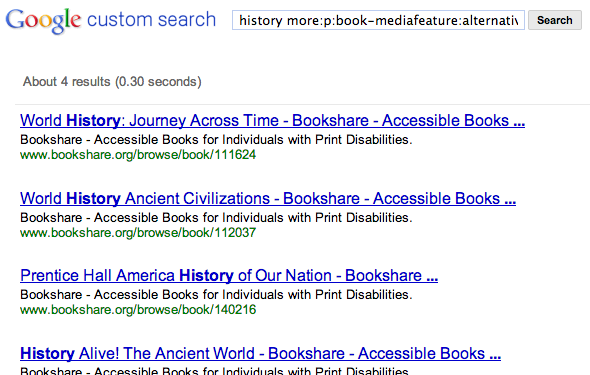Bookshare, the world’s largest online library of accessible eBooks for people with print disabilities, has just added accessibility metadata to its full library of over 195,000 titles. “We’ve had the information on content type, age ranges and available media forms locked away in our database, only useful to the most skilled internet searchers or through the search via our website or API.
Now, with the draft accessibility metadata semantic tags added, powered by microdata and schema.org, we can make this available in a manner that search engines can more easily find this information,” said Gerardo Capiel, VP of Engineering at Benetech. For example, the proof of concept Google Custom Search query below for history textbooks can be constrained to titles whose images have enhanced with rich descriptions by Bookshare volunteers:

You can do this yourself with two searches. The first is to search Bookshare for any titles involving history: that will return over 7,000 hits. The second, with just the titles that have alternative text for images or, better yet, long descriptions, is a search constrained by these mediafeatures: it returns just 14 items that are the higher value.
It was easy to scale this metadata conversion across all of Bookshare’s titles. Rather than requiring editorial work on each web page, these were database-generated web pages. The task was one of adding a few more tags or attributes around existing content. For example, for “World History Ancient Civilizations” above, elements like the title went from
<h1>World History: Ancient Civilizations</h1>
to
<h1 itemprop="name">World History: Ancient Civilizations</h1>
Other tags, such as
<meta itemprop="accessMode" content="textual"/> <meta itemprop="mediaFeature" content="structuralNavigation"/> <meta itemprop="mediaFeature" content="alternativeText"/>
were also added to tell the specific accessibility features of the book. More information on how to add accessibility metadata to your accessible content can be found on the resources page.